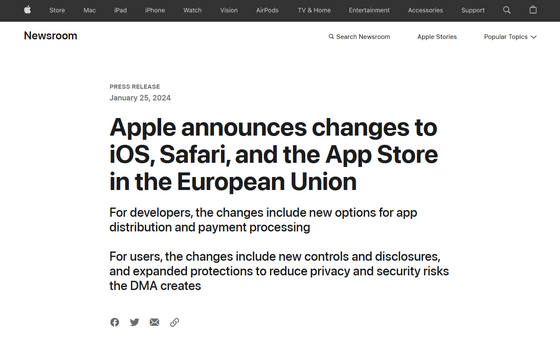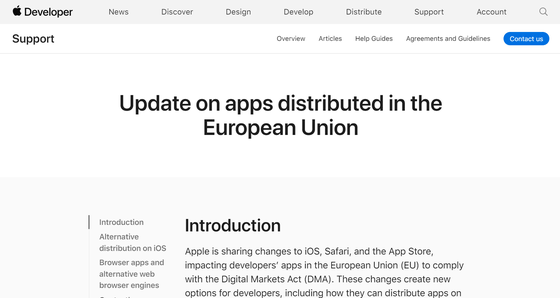Apple allows sideloading and payments outside the App Store in the EU in response to the Digital Markets Act, but strict conditions and new fees will be added

Apple has officially announced that it will allow iOS app distribution outside the App Store and payments outside the App Store in the EU after being designated as a gatekeeper under the EU's Digital Markets Act (DMA).
Apple announces changes to iOS, Safari, and the App Store in the European Union - Apple
https://www.apple.com/newsroom/2024/01/apple-announces-changes-to-ios-safari-and-the-app-store-in-the-european-union/

Update on apps distributed in the European Union - Support - Apple Developer
https://developer.apple.com/support/dma-and-apps-in-the-eu/

Apple is bringing sideloading and alternate app stores to the iPhone - The Verge
https://www.theverge.com/2024/1/25/24050200/apple-third-party-app-stores-allowed-iphone-ios-europe-digital-markets-act
Apple announces support for third-party iPhone app stores in the EU, coming with iOS 17.4 - 9to5Mac
https://9to5mac.com/2024/01/25/third-party-iphone-app-stores-ios-17-4/
The Digital Market Law was issued in November 2022 and came into effect in May 2023 with the aim of strictly regulating major IT companies such as Apple, Google, and Meta. The Digital Markets Act defines companies that provide core platform services as 'gatekeepers,' and six companies have been designated as gatekeepers: Google's parent company Alphabet, Apple, Amazon, ByteDance, Meta, and Microsoft. .
Seven major technology companies including Amazon, Apple, Google, and Microsoft admit to being ``gatekeepers'' under EU digital market law - GIGAZINE

Gatekeepers must comply with the DMA by March 6, 2024, or face fines of up to 10% of their total global turnover. Meta, which has been designated as a gatekeeper like Apple, allows users to unlink their Facebook and Instagram accounts.
Meta allows you to unlink Facebook and Instagram accounts to comply with the Digital Market Law - GIGAZINE

Apple limits the distribution of iOS apps to the App Store, and does not allow sideloading of iOS apps outside of the App Store due to security risks. However, it was pointed out that this restriction would ``obstruct free market competition'' and violate the Digital Market Law.
Apple said, ``Today, we are making changes to iOS, Safari, and App Store rules that affect apps from developers in 27 EU countries to comply with digital market laws.'' These changes include over 600 new APIs and This includes enhanced app analytics, alternative browser engine capabilities, app payment processing and iOS app distribution.'

Sideloading apps is available for users in the EU and is available starting with iOS 17.4. After consent through developer.apple.com, developers will have access to options that allow them to distribute in external app stores.
Apple claims that sideloading apps poses a high security risk and is a breeding ground for illegal content and crime. It states that features such as are not supported. Additionally, Apple cannot provide support regarding refunds, subscription cancellations, or user data privacy, leaving the developer and the app solely responsible.
To distribute an iOS app on an external app store, an app developer must contact the external app store developer and receive the security token required for distribution. App Store Connect, which allows you to manage iOS app sales, number of downloads, and reviews, will also be changed, and you will be able to add app stores other than the App Store to your app distribution destinations. More information about App Store Connect will be published in February 2024.
Similar to the App Store, external app store developers can install and support software on iOS devices, access data across their entire catalog of apps, and manage user purchases and subscriptions. . However, in order for the distributed app to work on iOS, it must be notarized by Apple. Therefore, apps distributed through external app stores will ultimately be managed by Apple's system.
External app stores are not something that anyone can open; they must be approved and qualified by Apple. In order to qualify for an external app store from Apple, you must meet the following conditions:
- Registered in the Apple Developer Program as an organization based in the EU, or has a subsidiary corporation based in the EU.
・Build an app whose main purpose is “discovery and distribution of apps.”
・Agree to provide and publish conditions for the apps you distribute, including those related to content and business model, and accept apps that meet those conditions.
Publish transparent data collection policies and give users control over how their data is collected and used.
- Comply with EU laws such as the Digital Services Act and the General Data Protection Regulation (GDPR).
- Responsible for addressing government and other requests to remove apps from external app stores.
・Continuously monitor and detect fraudulent apps, malware, and illegal apps in external app stores.
・Implement a system to review apps for intellectual property infringement before distributing them on external app stores.
・Provide Apple with an intellectual property dispute resolution process regarding external app stores or external app store apps.
・Providing Apple with a standby credit of 1 million euros (approximately 160 million yen) from a financial institution with a basic credit rating of A or higher to demonstrate appropriate financial means to guarantee support for developers and users. do.

Epic Games CEO Tim Sweeney, who has been in a legal battle with Apple for more than three years regarding the ``1 million euro standby credit'' at the end of the above conditions, said, ``In order to freely compete with Apple, we need 1 million euros in standby credits.'' It's unfair to have to have assets worth more than the euro, and Apple should be ashamed of itself for ruining the opportunity for its successors.'
Epic was founded with a few thousands dollars in funds - that I earned through mowing lawns. Apple was sinilar; later their first outside investor put in $250,000. Shame on Apple for shutting the doors to future computing opportunity for a new generation of innovators.
— Tim Sweeney (@TimSweeneyEpic) January 25, 2024
Additionally, the Digital Markets Act will require support for payment methods that do not go through the App Store. Therefore, Apple has announced that it will be possible to make in-app purchases using payment systems other than the App Store only within the EU.
With this change, there will be no 'Apple tax,' or fees on sales made through external payment methods. However, Apple stipulates that developers must pay a ``core technology fee'' of 0.50 euros (approximately 80 yen) for each annual number of app installs. This core technology fee is free for the first 1 million installs, and will be charged for excess installs. This means that there is no core technology fee for apps that do not exceed 1 million installs per year.
Apple explains that the core technology fee is intended to 'reflect the value we provide to external app developers through our continued investments in developer tools, technology, and programmatic services.' However, this fee will be waived if it is a non-profit organization, certified educational institution, or government agency.
The fee charged for app sales using App Store payment methods is normally 30%, but it has been increased to 17% for app developers in the EU. Furthermore, for small businesses with annual revenue of less than $1 million (approximately 148 million yen), the fee will be reduced to 10%.
In addition, Apple has announced that it will introduce an API in iOS 17.4 that will enable contactless payment transactions in banking and wallet apps for app developers in the EU. This will allow third-party banking and wallet apps to make payment transactions using NFC terminals.
Related Posts:
in Mobile, Software, Web Service, Posted by log1i_yk







